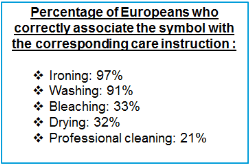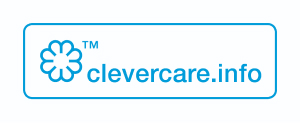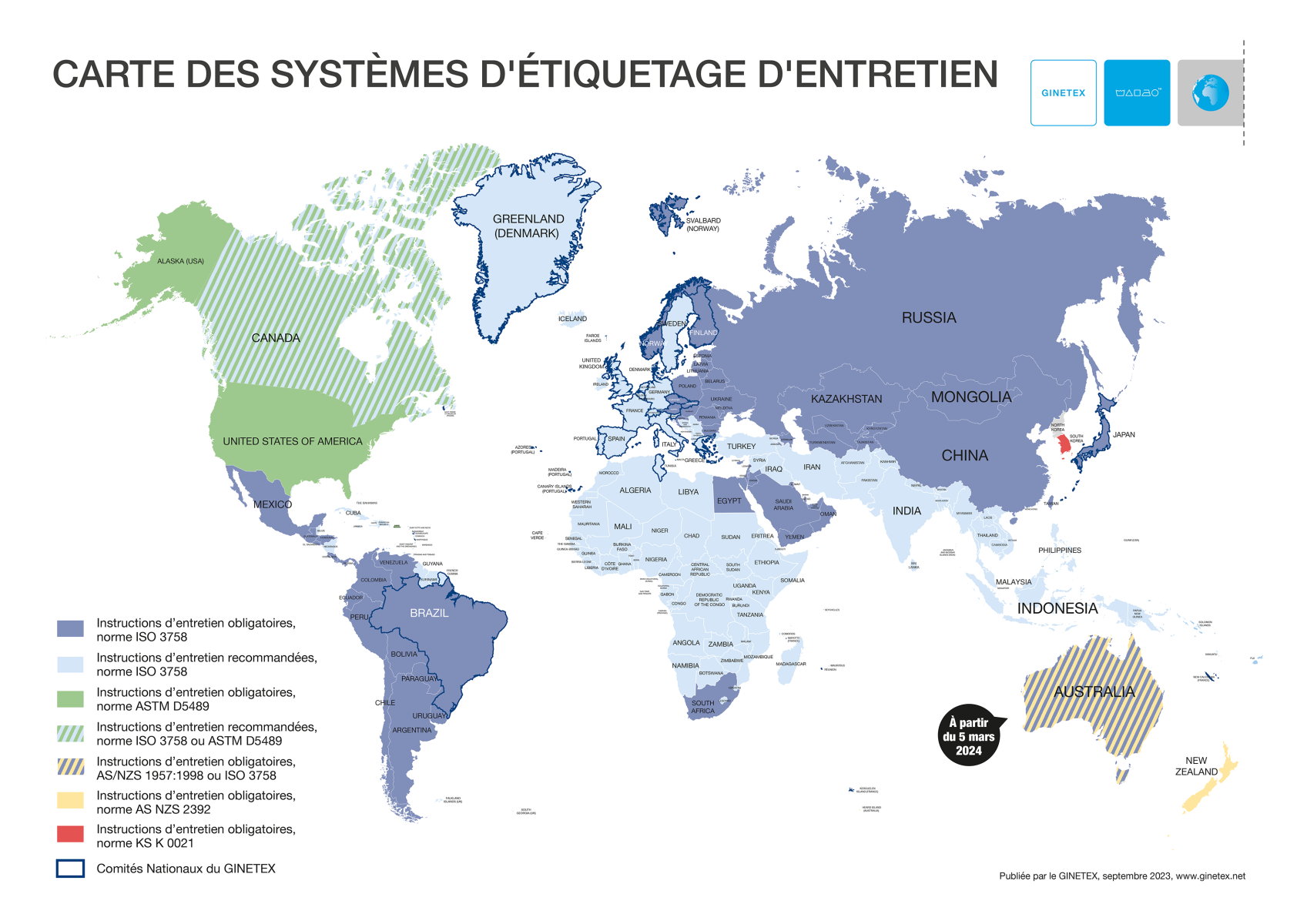A barometer for Textile care labelling in Europe
IN PARTNERSHIP WITH IPSOS, GINETEX PRESENTS THE OUTCOMES OF ITS EUROPEAN BAROMETER: "EUROPEANS AND TEXTILE CARE LABELLING"

70% of Europeans follow the textile care instructions featured on the labels and
80% admit that they would not (or would rarely) buy clothes without any labels,
While another 84% feel concerned by water and energy savings.
GINETEX, the international Association for Textile Care Labeling, called upon the French market research company IPSOS, to evaluate the behavior of European Consumers with regards to textile product labels and care symbols. This study, carried out in December 2016, combines the results of six different countries, gathered from a sample of 6,000 people in Germany, England, France, Italy, the Czech Republic and Sweden.
This IPSOS study reveals that 70% of Europeans follow the textile care instructions represented by the symbols. At a pan-European level, 57% even admit that they follow them 'often' and 13% do so 'always'. These figures illustrate the importance of care instructions in the minds of European consumers.
- 38% state that they follow these instructions in order to avoid washing problems such as shrinking, in the first place
- 31% follow them in order to preserve their clothes and keep them longer, as a second reason
Overall, Europeans consider labels as too cumbersome and 62% admit cutting them out: for 74% of them, the labels itch and irritate their skin and for another 55%, they are often too long and uncomfortable. These results can differ from one European country to another.
However, the presence of the label is a real purchasing criterion since 80% of Europeans state that they would never or rarely buy a piece of clothing without a label.
Internet and smartphones: true virtual partners for textile labels
Here's from a positive perspective: when solving a specific washing issue or when faced with symbols that they don't understand, 53% of respondents are curious about their meaning and automatically look them up on the Internet: 39% use a computer and 21% use their smartphone.
Ironing and washing symbols are the most recognized by Europeans!
The study reveals that the ironing and washing symbols are the ones that are best understood by our neighbors: scoring respectively 97% and 91%.
|
The three other symbols remain unclear to consumers:
The same is true for special features such as underscores under the symbols, noticed by only 1 out of 4 Europeans.
|
 |
Eco-care, a major issue for European consumers!
The IPSOS study reveals that 84% of Europeans feel concerned about water and energy savings. And among Europeans who feel concerned, 90% take specific eco-actions when caring for their textile products.
It is worth mentioning that European consumers already seem to adopt the proper eco-habits when caring for their textiles.
- 62% choose "natural drying as soon as possible"
- 61% do "mainly low temperature washes"
- 44% use the "Eco program"

GINETEX values eco-caring for textiles, in particular via its clevercare.info logo, already used by a number of major international brands, in addition to the 5 textile-care symbols. With its own site dedicated to the general public, this logo's objective is to raise awareness and to inform consumers about the simple and easy actions to adopt for textile eco-caring.
"The results of this GINETEX-IPSOS barometer are positive and encouraging. They reflect the fundamental role of GINETEX and that of our international committees who work to increase the understanding of textile care symbols. Our mission is to work on a long-term basis - an effort also confronted with obstacles such as the misinterpretation of symbols and the removal of labels. Together with our member brands, we must continue to reinforce our actions with the general public to ensure all our symbols (and special features) are understood by all, throughout the world. Our permanent goal of standardizing and harmonizing our textile care labeling system worldwide contributes to this improvement every day", says Adam Mansell, President of GINETEX.
Study Methodology:
In this study, a sample of 6,000 people from Ipsos' Online Access Panel, aged between 18 and 65 and representative of the European population was surveyed for the following countries: Germany, Great Britain, France, Italy, the Czech Republic and Sweden. The survey was conducted online in December 2016.
About GINETEX
GINETEX, the International Association for Textile Care Labelling, was first founded in Paris in 1963 following several international Symposiums for Textile Care Labelling at the end of the 1950’s. GINETEX has devised an internationally applicable care labelling system for textiles based on symbols. The pictograms used are registered trademarks and are the GINETEX property. The care labelling system gives consumers and textile companies the correct information on the care treatment of textile products. The processes indicated by the symbols will avoid any irreversible damage to the product. GINETEX is composed by 22 national organisation members. These organisations represent all interested parties concerned with textile care and labelling.
GINETEX Contact
Pascale FLORANT
Secretary General
+33 (0)1 47 56 31 71
Actualités
UN NOUVEAU PRESIDENT POUR LE GINETEX -
Le 8 Novembre 2024, Adam Mansell a été nommé président du GINETEX pour une période de 2 ans à compter du 1er janvier 2025. Il est le Directeur Général de UKFT.
ENTRETIEN DU LINGE – Quelle consommation d’énergie pour le séchage des textiles ? Le GINETEX dévoile les principaux enseignements de son étude sur son impact sur les cycles de séchage.
La norme ISO 3758:2023 a été publiée
Le 6 décembre 2023, a norme ISO 3758:2023, Textiles – Code d'étiquetage d'entretien utilisant des symboles, a été publiée par l’ISO.
Cette 4ème édition annule et remplace la 3ème édition (ISO 3758 :2012), qui a fait l’objet d’une révision technique.
RESULTATS DU 4ème BAROMETRE EUROPEEN IPSOS 2023
Quelles sont les habitudes d'entretien textile en Europe ?
RESPONSABILITE ELARGIE DU PRODUCTEUR (REP)
La loi AGEC impose depuis le 1er janvier 2022, l'apposition d'une signalétique TRIMAN et d'une info-tri sur les produits tels que les textiles d'habillement, le linge de maison et les chaussures.
UN NOUVEAU PRESIDENT POUR LE GINETEX
M. Thomas Lange, de l’association GermanFashion, a été nommé président de GINETEX pour 2 ans à compter du 1er janvier 2023.
RESULTATS DU 3ème BAROMETRE EUROPEEN IPSOS 2021
Les considérations environnementales sont au cœur des nouvelles habitudes d’entretien textiles des Européens.
BREXIT : L'IMPACT SUR L'ETIQUETAGE
Les régles d'étiquetage des textiles changent au 1er janvier 2021. Voici les principales évolutions.
Textile & Fashion Care Awards 2023: Les candidatures sont ouvertes !
Des Awards pour promouvoir l'entretien textile de demain
LA CHARTE SUR LE NETTOYAGE DURABLE
L’A.I.S.E. présente les premiers produits conformes aux nouveaux critères de la Charte du Nettoyage Durable et relance sa plateforme cleanright.eu
RÉSULTATS DU DEUXIÈME BAROMÈTRE EUROPÉEN IPSOS 2019
C'est une des tendances majeures qui ressort de ce baromètre: la durabilité des vêtements est au coeur des préoccupations des Européens qui souhaitent les préserver le plus longtemps possible.
GINETEX SIGNE LA CHARTE DE L'ONU
En signant la Charte de l’industrie de la mode pour l’action climatique des Nations Unies, nous poursuivons notre engagement sur les changements nécessaires à mettre en œuvre pour diminuer l’impact de l’industrie de la mode sur l’environnement.
COMMENT ENTRETENIR UN MASQUE EN TISSU ?
En cette période d'épidemie, le GINETEX vous donne les principales recommandations pour entretenir les masques de protection en tissu.
LE SITE CLEVERCARE.INFO FAIT PEAU NEUVE !
Cette nouvelle version s’enrichit de nouvelles rubriques pour devenir la référence des consommateurs en matière d’éco-entretien.
DEVENEZ MAÎTRE DE VOTRE LINGE, GRÂCE AUX CONSEILS DE L’A.I.S.E., DE L’APPLIA & DU GINETEX
Une liste de conseils courte et claire pour un entretien durable de nos textiles, dès l'achat de la machine à laver, jusqu'au rebut de l'emballage de lessive.
UN NOUVEAU PARTENARIAT
Le GINETEX est maintenant membre de la Sustainable Apparel Coalition - ces deux organisations mondiales unissent leurs forces pour un monde meilleur!
UN BAROMÈTRE POUR L’ÉTIQUETAGE D’ENTRETIEN TEXTILE EN EUROPE
Le GINETEX, en collaboration avec IPSOS, présente les résultats de son baromètre européens "les Européens et l'étiquette d'entretien textile
CLEVERCARE.INFO
Le GINETEX a conçu un logo pour l'entretien durable, applicable à travers le monde. Les consommateurs sont informés de la façon dont ils peuvent réduire leur impact environnemental lorsqu'ils prennent soin de leurs textiles.
UN NOUVEAU PRESIDENT POUR LE GINETEX
M. Alejandro Laquidain, de Consejo Intertextil Español (CIE), a été élu président du GINETEX au 1er janvier 2021, pour une période de deux ans.
Nos membres nationaux

Le GINETEX s'appuie sur un réseau de 22 Comités Nationaux en Europe, Amérique du Sud, Afrique et en Asie. Pour contacter le GINETEX dans votre pays, merci de vous référer à notre carte interactive.
VIDÉO

Le GINETEX a conçu un logo pour l'entretien durable, applicable à travers le monde. Les consommateurs sont informés de la façon dont ils peuvent réduire leur impact environnemental lorsqu'ils prennent soin de leurs textiles.


